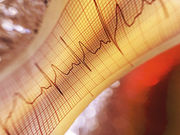Nearly 80 percent of patients were alive two years after reveiving device
THURSDAY, Jan. 19, 2017 (HealthDay News) — Seniors who receive an implantable cardioverter-defibrillator (ICD) have high survival rates, according to a study published in the Jan. 24 issue of the Journal of the American College of Cardiology.
Frederick Masoudi, M.D., chief science officer for the National Cardiovascular Data Registry at the American College of Cardiology, and colleagues analyzed data from 12,420 Medicare patients, aged 65 and older, who received an ICD for secondary prevention.
Nearly 80 percent of the patients survived two years after receiving the implanted device. More than 65 percent of the patients were hospitalized during the two years after receiving an ICD. Rates ranged from 60.5 percent among those younger than age 70 to 71.5 percent among those 80 and older. The researchers found that 13.1 percent of patients younger than 70 and 31.9 percent of those 80 and older were admitted to a skilled nursing facility. The risk of being admitted was greatest in the first 30 days after the procedure. The older the patient, the greater the risks of either hospitalization or admission to skilled nursing facility.
The findings suggest doctors are doing a good job of selecting elderly patients for ICDs. However, the authors of an editorial that accompanied the study offered a caveat. While these older patients “may have reasonable overall survival, they also have significantly high rates of admission to hospitals and skilled nursing facilities, with no clear evidence of mortality benefit from the device,” Sumeet Chugh, M.D., the associate director of the Cedars-Sinai Heart Institute in Los Angeles, and colleagues write in the editorial.
One author disclosed financial ties to medical device companies.
Copyright © 2017 HealthDay. All rights reserved.








